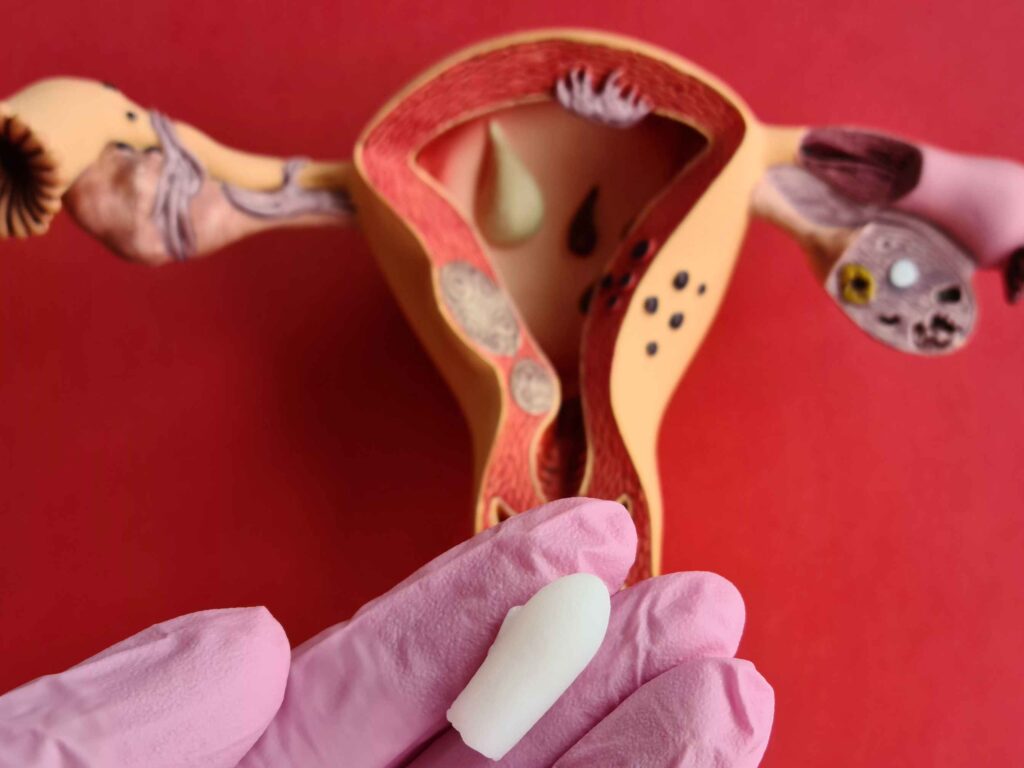Table of Contents
ToggleThe Importance of Vaginal Health
Vaginal health is an integral part of a woman’s overall well-being. It impacts personal comfort, reproductive functions, and sexual health. When the vaginal environment is balanced, it acts as a natural barrier against infections, irritation, and other complications. However, when there is a disruption in bacterial balance or hormonal changes, health issues may arise that affect both daily life and intimacy.
Therefore, proper vaginal care involves maintaining good hygiene, choosing breathable clothing, and following a balanced diet. These habits, in turn, help protect the natural vaginal flora (beneficial bacteria) and reduce the risk of infections and other complications.
Common Vaginal Health Issues
Women may face several vaginal issues due to hormonal changes, infections, environmental factors, or lifestyle habits. Below, you’ll find the most common problems and their possible causes:
Yeast Infection (Candidiasis)
This condition occurs due to the overgrowth of Candida fungi. As a result, it can lead to:
-
Intense itching, irritation, and redness
-
Thick, white, cheese-like discharge
Possible causes include:
-
Use of antibiotics, which eliminate beneficial bacteria
-
High sugar consumption, as it feeds the yeast
-
Wearing tight or non-cotton underwear, which increases moisture
To prevent this:
-
Wear breathable cotton underwear and avoid prolonged dampness
-
Eat probiotic-rich foods like yogurt to support bacterial balance
-
Reduce intake of sugars and refined carbohydrates
Bacterial Vaginosis (BV)
This occurs when the balance between good and harmful bacteria in the vagina is disrupted. Typical symptoms include:
-
A strong, fishy odor
-
Grayish or white discharge
-
Mild burning or irritation
Some common causes are:
-
Frequent vaginal douching, which destroys beneficial bacteria
-
Unprotected sex, which alters the bacterial balance
-
Hormonal shifts during pregnancy or contraceptive use
To reduce the risk:
-
Avoid using scented washes or douches
-
Use condoms during sex to protect the vaginal flora
Urinary Tract Infections (UTIs)
Although not a direct vaginal issue, UTIs are closely linked to the transfer of bacteria from the vaginal area to the urinary tract.
Symptoms typically include:
-
A burning sensation while urinating
-
Frequent urge to urinate, with only small amounts passed
-
Lower abdominal or pelvic discomfort
To help prevent UTIs:
-
Drink plenty of water to flush out bacteria
-
Urinate after intercourse to minimize bacterial transfer
-
Always wipe from front to back after using the toilet
Vaginal Dryness
This condition is common during menopause, after childbirth, or due to medications like antidepressants or hormonal contraceptives.
It may cause:
-
Pain during intercourse due to reduced natural lubrication
-
Itching or irritation in the intimate area
To prevent or manage it:
-
Stay hydrated throughout the day
-
Eat foods rich in omega-3s such as fish and nuts
-
Use natural vaginal moisturizers or water-based lubricants during sex
Sexually Transmitted Infections (STIs)
These include infections such as chlamydia, gonorrhea, genital herpes, and HPV.
Possible signs include:
-
Yellow or green abnormal discharge
-
Pain in the pelvic area or while urinating
-
Sores or blisters in the genital region
For prevention:
-
Practice safe sex using condoms
-
Get regular screenings, especially if you have multiple partners
How to Maintain Vaginal Health
1. Personal Hygiene
-
Use warm water and mild, unscented soap to wash the outer vaginal area only
-
Avoid vaginal douching, as it disrupts the natural flora
-
Always wipe from front to back to prevent bacterial spread
2. Healthy Nutrition
-
Eat probiotic-rich foods such as yogurt, kefir, and fermented vegetables
-
Drink plenty of water to stay hydrated and maintain vaginal moisture
-
Cut down on sugar and refined carbs, which promote yeast growth
3. Comfortable Clothing
-
Choose cotton underwear for better airflow
-
Avoid tight-fitting clothes and damp conditions for extended periods
4. Avoid Harmful Products
-
Stay away from scented washes, pads, and harsh chemicals
-
Opt for pH-balanced products that preserve the natural vaginal environment
5. Manage Stress and Hormonal Balance
-
Practice relaxation techniques like yoga or meditation
-
Get sufficient sleep and reduce stress to maintain hormonal stability
When Should You See a Doctor?
If you experience any of the following, it’s best to consult a healthcare provider:
-
Persistent itching or burning that doesn’t improve with routine care
-
Discharge with an unusual color or odor
-
Pain during sex or urination
-
Irregular bleeding between menstrual cycles
-
Unexplained sores or swelling in the vaginal area
Conclusion
Vaginal health is essential for daily comfort, reproductive wellness, and sexual well-being. By maintaining good hygiene, eating healthily, choosing suitable clothing, and practicing safe sex, you can prevent many common vaginal problems. Additionally, regular medical checkups and open communication with healthcare professionals support early detection and long-term vaginal health.

Suleiman Atieh, experienced pharmacist specializing in healthcare, patient wellness, safe medication practices, disease management, and supplement guidance.








